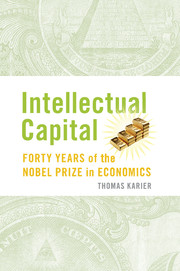Book contents
- Frontmatter
- Contents
- Preface
- Economic Nobel Laureates
- 1 An Economic Prize
- 2 Free-Market Economics
- 3 Micro: The Chicago School
- 4 Stock Market Casino
- 5 More Micro
- 6 Behaviorists
- 7 Keynesians
- 8 Classical Revival
- 9 Inventors
- 10 Game Geeks
- 11 General Equilibrium
- 12 A World View
- 13 Numbers Guys
- 14 History and Institutions
- 15 Reshaping the Prize
- Notes
- Index
- Frontmatter
- Contents
- Preface
- Economic Nobel Laureates
- 1 An Economic Prize
- 2 Free-Market Economics
- 3 Micro: The Chicago School
- 4 Stock Market Casino
- 5 More Micro
- 6 Behaviorists
- 7 Keynesians
- 8 Classical Revival
- 9 Inventors
- 10 Game Geeks
- 11 General Equilibrium
- 12 A World View
- 13 Numbers Guys
- 14 History and Institutions
- 15 Reshaping the Prize
- Notes
- Index
Summary
Alfred Nobel was probably the richest man in Europe when he died in 1896. A serious scientist and inventor, he had taken great personal risks in his early experiments with the unstable explosive nitroglycerine. In fact, during a low point in his career, he lost his younger brother in a laboratory explosion and came close to losing his own life. But because of a stubborn dedication to his work and a confidence in his own ability, he persevered, overcoming technical difficulties and ultimately succeeding in creating a more stable and more practical explosive, dynamite. Equally powerful as nitroglycerin but many times more useful, dynamite would revolutionize mining and construction of canals, roads, and railroads. It was one of the great discoveries of the nineteenth century and would open the door to the industrial revolution and the modernization of industry and transportation.
The potential uses for dynamite were almost immediately apparent, creating a huge demand and opening up a great business opportunity. Unlike many inventors, Alfred Nobel easily made the transition to business and found that he was just as good at manufacturing and marketing as he was in the laboratory. He built factories to produce dynamite, fought to protect his patents from rivals, and developed a sales program to sell dynamite across the globe. Like his father, he also dabbled in the development of military explosives, but it was dynamite that made him rich.
- Type
- Chapter
- Information
- Intellectual CapitalForty Years of the Nobel Prize in Economics, pp. 1 - 13Publisher: Cambridge University PressPrint publication year: 2010



